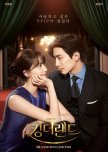
This review may contain spoilers
Power of Kindness and Connections!
We’ve seen many times how one life touches so many, and how one act of kindness can be like a pebble dropped into a pond. Its ripples stretching all the way across. People should never underestimate what one act of kindness can do for someone. We never know if a smile, a kind word, or act might will have an effect that we can’t possibly predict or fathom.Life is about connections. Connecting with ourselves as well as connecting with others. Chihiro is a former sex worker who now works at a small bento shop in a seaside town. Initially, a person may scoff at her former life as a sex worker and judge her as someone of little/no value. Ah! How often do we judge a book by its cover? The film invites us to understand how a connection and a small act of kindness can help someone in need, while also learning how to dispel our own judgments about people.
The film opens with Chihiro paying attention to and playing with a cat. Initially, one might wonder why this is such a compelling scene. Because more often than not, how a person treats animals is often an insight into how a person treats people. Chihiro greets the customers warmly, and we can see her warmth is genuine. It isn’t fake or an attempt to win anyone over. It’s simply how she interacts with others.
Throughout the course of the film, we find Chihiro helping a variety of people. An old, homeless man down by the waterfront. She brings him a meal, gives him some company as they eat, and even invites him into her home so that he can have a bath. And sadly, when she’s looking for him in order to bring him another meal, she finds that he has died behind a small fence, and she takes the time to give him a proper burial in the middle of the night.
Chihiro also befriends a couple of high school girls who see themselves as outcasts within their own families. Chihiro treats them with kindness, accepting them fully as they are. Kuniko is one of these girls who’s basically told what to do in a family home with little warmth. When she’s given a meal by a single mother—as a means of gratitude for helping her son—Kuniko breaks down in tears, overwhelmed that she’s found more warmth from this stranger than she’s possibly received in her own home.
Chihiro also has to deal with the same, single mother who is outraged that Chihiro has been feeding and spending time with her son, Makoto, a lonely boy who has to spend much of his time fending for himself because his mother works. When the boy gets an idea from a TV commercial to buy flowers for his mother, the mother wrongly accuses of Chihiro of being behind it. After having the flowers thrown in her face, Chihiro calmly hands the flowers back, telling the mother that she will be making a huge mistake if she doesn’t accept the flowers and to see her son for what he is: a kind but lonely little boy who simply wants to show his mother how much he loves her.
Lastly, Chihiro also interacts with a woman in a hospital who has recently lost her eyesight. Little does the woman know that Chihiro is the woman she’d briefly had an encounter with, it becomes apparent that the woman is more of a mother to Chihiro than Chihiro’s own.
Chihiro is like a breath of fresh air, a gentle rain, a beam of sunshine as we quickly discover how she interacts and touches the lives of the various souls around her. Nothing about her is superficial or fake. She’s asked by her friend and former co-worker in the sex trade why she’s never fallen in love. It becomes apparent that Chihiro does not find romantic relationships appealing, largely due to their selfishness and propensity to strip a person of their freedom to be who they are.
Kasumi Arimura is a true delight in this film, and she shines brightly on the screen as she invites the viewer to look past her past. A person isn’t necessarily their job. How they treat others and interact with them counts the most. And like a passing rain—seeing that her job is done—she moves on to the next town, the next job, spreading her joy for life to everyone she meets. She takes pride in small moments of sitting on the dock in the sun or standing barefoot in the water.
I also found it interesting when I looked it up that Chihiro means, “A thousand questions.” This name is appropriate as one might have a thousand questions about her, but find that much like the wind, she can’t be pinned down to one thing or perhaps even grasped. Everyone could use a “Chihiro” in their life, and hopefully, everyone can try just a bit harder to be a Chihiro for others.
Was this review helpful to you?

This review may contain spoilers
Breathtaking Love Story About Letting Go of the Past
Ever since I began really getting into K-Dramas, the one series that has eluded me is this one. It wasn’t in the US region, and I’d heard so many things about it that I kept trying to figure out a way to watch it. Fortunately, moving to Taiwan put me in a different Netflix region, and I almost missed it again, because it’s under the title, “Guardian: The Lonely and Great God.”My expectations for this series were surpassed in every way. I was slightly worried that the reputation of the series would somehow come up short. It didn’t. This is one of the most charming and transcendent love stories I have ever seen. It’s light, beautiful, and full of laughter and tears. In short, it’s full of Life. And perhaps that is why it has touched the hearts of so many.
The four leads of this series are all captivating and you scarcely want to blink for fear of missing something whenever any of them are on screen. Gong Yoo (Kim Shin) has the smoothest, most soft-spoken, and calming voice I think I have ever heard. He reminded me of Cary Grant, one of history's most romantic and effortless actors. He has such charm that he doesn’t have to do much to be in awe of his performance.
I haven’t seen Kim Go Eun in many things, but this is easily the most vivacious and endearing role that I have seen her in. She plays Ji Eun Tak to perfection. She has such a lovely smile and bubbly personality that you can easily see why Kim Shin is so taken with her. Despite her hardships, she simply oozes Life itself.
Lee Dong Wook, the grim reaper with a past, plays the very heartbroken and wounded soul who somehow senses that he’s done something terrible in his past. I’ve seen this talented actor in several series now. As good as Gong Yoo is at acting with his eyes, Lee Dong Wook shows us every ounce of pain that his character is going through. We feel it. We eventually know of the horrendous things he’s done, but in the end, all we want is for him to let go of the pain.
Finally, we have Yoo In Na, an actress I have only seen one other time in “Touch Your Heart.” She is such a charmer with that incredible smile of hers and her very youthful expressions. Only Yoo In Na can take a somewhat conceited character and make her likable and pleasing. She did the same in “Touch Your Heart” and it’s obviously something she’s a master at doing. In many ways, she’s a character who’s torn between the Goblin and the Reaper, and we somehow sense that she knows this. Perhaps that it also why, despite the pain of the past, she’s the strongest of the three because she’s actually able to let go.
While this is an absolutely endearing love story, the series’ power is its message of forgiveness. Everyone carries baggage around, holding on to the painful experiences of the past with the weights of guilt and shame for the things we’ve done. For the Goblin, this is represented by the sword. For Sunny, it’s the ring. And for the Grim Reaper, it’s his hat. And the glue that binds them, with the wisdom of living a free and carefree life, is Ji Eun Tak.
How long must people continue to suffer before we let ourselves and others off the hook? Punishment does not come from anyone or anything except for ourselves. So, how long will you continue to carry the burden? Release lies in the wisdom and power of forgiveness, which is the process of letting go. Leave all of your burdens behind.
The music of this series mirrors the series itself with light piano pieces and soft songs that always seem to mirror the story, the characters, and even the environment. I loved how part of the series was filmed in Quebec, obviously during the fall season when the scenery is at its most captivating.
The series doesn’t miss a beat with some outrageously hilarious moments. One of my favorites was when the Goblin and the Reaper are trying to figure out how to use a cell phone and the camera that goes with it. Gong Yoo and Lee Dong Wook had me laughing so hard during that scene! It was priceless.
Korean performers are masters of emotion. The tears that were shed were so powerful and convincing by all four actors, that it had you really feeling those moments of sadness and pain. That is what separates Korean actors from so many others: they make you FEEL it! When Ji Eun Tak loses the Goblin, and she begins to wail uncontrollably on the rooftop, you can’t help but feel her pain and despair. The same happens for the Goblin in the last episode. But alas, all is not lost. No one goes away forever, and that is another aspect of the story that is truly beautiful and what made that final scene so epic.
Goblin is easily one of the best series I’ve ever seen, and at some point, I will certainly wish to sit down and watch it again. Goblin is like sitting at home under a warm blanket, drinking a cup of hot coffee in front of a fireplace while the autumn leaves fall outside in the crisp air with the reminder to enjoy Life and each moment.
Was this review helpful to you?

This review may contain spoilers
Resident Playbook is Like a Dazzling Sunset!
If Hospital Playlist is like a warm blanket on a cold night, then Resident Playbook is like a dazzling sunset on a warm summer night. This fantastic spin-off series beautifully captures many elements of the previous series that have captivated millions. Hospital Playlist is one of my all-time favorite series. I have most of the songs on my iPod, and while I still feel that Hospital Playlist is a better series, make no mistake - Resident Playbook is simply delightful. It’s also different in many respects.Resident Playbook follows four first-year residents in the OBGYN department. You’ll note that Hospital Playlist’s protagonists were four men and one woman. Here, we have three women and one man. One difference is that the characters from Hospital Playlist knew each other for years, and it was apparent from the chemistry they all had. Here, four first-year residents are pooled together, with only two of them knowing each other as former classmates.
Oi Young is the reluctant young woman who started the resident program previously but quit. She’s also in serious debt and living with her sister, her sister’s husband, and the husband’s brother, Koo Do Won, whom Oi Young has a crush on. Koo Do Won is a charming and delightful upper resident of the OBGYN department. Oi Young doesn’t realize that she has great, natural ability, but she’s always a bit hesitant and unsure of herself. She’s easily the most unhappy of the four, always trying to find a way out of her predicament rather than finding the joy in her work. Of course, as time moves on, she slowly begins to realize her gift.
Pyo Nam Gyeong is the drama queen of the group. That isn’t a knock against her. She actually brings a lot of charm for someone who loves to shop and read the latest horoscopes. She has an even bigger heart than she realizes, and she forms a quick attachment to a patient who appears to be too demanding. Pyo Nam Gyeong wears her heart on her sleeve.
Um Jae Il is the “energizer bunny” of the group! This guy’s got a full tank and then some in reserve. He’s very eager to learn but even more eager to help the patients as much as possible. He’s a bit of a perfectionist when it comes to making sure he does things right, which drives the second-year residents crazy! He’s a bit too cautious sometimes and struggles to learn how to be confident in his decision-making. He’s not shy about losing sleep if it means being there for a patient.
Finally, we come to my personal favorite, Kim Sa Bi. Nicknamed “the android” due to her intellectual prowess and really not caught up in feelings, she tends to drive people crazy with how much she knows. However, even Kim Sa Bi has to learn the difference between book knowledge and experience. She can come across as a bit arrogant, and she doesn’t like it if someone appears to know more than she does, which got her into a brief spat with Oi Young. She even speaks in an almost robotic-clipped manner, which, frankly, I found endearing. She rarely smiles, but when she does, she lights up the room. However, even Kim Sa Bi can’t hide her admiration for the previous all-boy band member, Um Jae Il! Their dance sequence is easily one of the highlights of the series! Her struggles are about trying to be more empathetic and caring toward her patients.
Resident Playbook is a series that gets off to a somewhat slow start. This isn’t necessarily a bad thing as there are many new characters to get to know within the span of the first few episodes. However, once it gets going, it keeps going until you can’t wait to see the next episode. After only 12 episodes, I was a bit sorry that the series didn’t extend to the usual 16. I wanted more.
Performances are fantastic, and seeing yet another collective group of performers do so well that you like all of them says a lot about the depth and quality of the characters. Of course, anyone who has seen Hospital Playlist will gasp and cry out with joy when you see all five of them make cameo appearances throughout this series. They also got together to contribute more songs!
Resident Playbook is a different type of series in which we see the struggles of four new residents trying to learn and stick it out in a very stressful department. One can only imagine the number of hours and amount of dedication it takes for someone to endure all of the trials and tribulations that go with it. One can’t help but be impressed.
Much like its parent show, Resident Playbook has a number of heartfelt moments as well as inspirational ones that will touch your heart and soul. There are also quite a few moments to tickle your funny bone too.
Resident Playbook is simply a terrific feel-good series that has the viewer wishing that there was still more to come!
Was this review helpful to you?

This review may contain spoilers
Lackluster and Ultimately Disappointing Series With Cowardly Characters!
By the time you reach the last few episodes, the series becomes like a plate of mushy carrots. You choke them down just to get through them, so you can move on to something better.I’m going to start this review by saying that Shin Hye Sun is one of my favorite actresses, and I started watching this series because I saw that she was in it. However, I will say that this is the worst series that I’ve seen with her. It’s not her fault, however. As always, she gives an illustrious performance, given the lackluster and convoluted story and a very unappealing character in Cho Sam Dal.
The series is pretty solid through about the first eight episodes or so, but then it’s all downhill from there. No, it’s actually more like dropping off a cliff because the lack of story, quality, and direction, are suddenly nowhere to be found.
Cho Samdal is a prominent photographer, rising to near the top of stardom as one of the most sought-after photographers in the business. She photographs model and celebrities. Her protégé torpedoes Samdal’s career, forcing her to retreat to Jeju Island, where she is from. She hates the island, viewing it as a primitive locale where no one can possibly succeed in anything. What we end up having is a character who whines, drinks, and cries—often in that order too! At heart, she’s a true coward and unable to deal with her thoughts, feelings, or desires as well as her inability to stand up for herself. There is very little that is actually appealing about Cho Samdal.
Cho Young-Pil is a weather man based on Jeju Island and Samdal’s former boyfriend. Young-Pil is a man dealing with the tragic death of his mother—a haenyeo diver (women who dive for mollusks and other sea life) eight years prior. At the start, all we know is that Young-Pil and Samdal broke up, leaving the viewer to question why the breakup occurred as well as who instigated it. We find that one of the most cowardly characters of the entire series is Sang Tae, Young-Pil’s father.
A drowning man will always try to pull someone down, and Sang Tae is the spitting image of a man so lost within his own grief, that he sabotages Young-Pil and Samdal’s relationship. He holds Samdal’s mother responsible for the death of his wife, despite the two women being the best of friends. What is sad is that Young-Pil never really confronts his father about his irrational and self-destructive behavior. Even when Sang-Tae is verbally abusing Samdal, Young-Pil simply stands there without offering any defense or attempt to pacify. Sang Tae is a man who can’t see anything beyond his own pain, which literally mars and threatens to destroy the true memory and love of his wife. However, nobody bothers to even bring up this point with him. He spends his time drinking and sulking. The ultimate coward is the one who won’t let go.
In the midst of this, Go Mi-ja (Samdal’s mother) is suffering from a heart condition, which we might well connect with her own grief and guilt. I found her character the most appealing, and I wished the story had focused more on her and the friendship she shared with Young-Pil’s mother.
One side-story that was also far more appealing than the main one, involved Hae Dal Cho, the youngest sister and widow of Samdal. Her interactions with Ji Chan—a dolphin expert—were sweet and far sweeter than anything between Samdal and Young-Pil. I would have preferred a story surrounding her than Samdal.
By the end of the series, we have a cast of characters who are largely cowards at heart. Samdal is unable to deal with her past or even truly fight for her future. Doormats are only appealing because you can wipe your feet on them, and yet Samdal allows her protégé to use her as one three times throughout the course of the story. Samdal only wags her finger at her protégé, which does absolutely nothing. And I’m not entirely sure why Samdal would allow her ex-boyfriend to work with her after he betrayed her. So many things in this series made absolutely no sense at all.
It's sad how everyone believes that a “better life” must be in Seoul rather than in Jeju. I would have preferred seeing everyone make a success in Jeju, rather than treating it as the hindquarters of Korea where success goes to die. Who said you have to go to a big city in order to be successful? Not only is this deluded thinking, it’s also untrue. Samdal only succeeds in revealing her level of immaturity by how much disdain she has for her hometown.
Also, are you seriously going to tell me that someone with her wealth and notoriety doesn't have an attorney on retainer?! That was about the most ridiculous thing of this series as if the writer had no clue!
The writer and director clearly had no idea where to take the story, and we have everything magically being resolved within the last few episodes without any viable explanation. Samdal doesn’t bail herself out. Everyone else does it for her, leaving the viewer to realize that she’s still never grown up or known how to take care of herself. True strength isn’t as much about helping someone out of trouble as it is about helping them figure out how to get themselves out of trouble! The story would have been far better served had they chosen that road.
Despite having some truly hilarious moments—especially the seaweed fight—Samdal is just a very annoying and largely unlikable character. She acts like a 14-year-old child most of the time. She gets angry with Young-Pil over the smallest things. She peeks at him through her bedroom window, and then gets angry when he confesses his feelings for her. She then runs off like a scared child and barricades herself in a shed because she can’t deal with any challenges or forms of confrontation. She’s about as big of a coward as you will ever find! I also lost count of how many times she hits Young-Pil. It was supposed to be humorous, but by the tenth or eleventh blow, it just becomes silly and tiresome.
Given the great cast and acting performances that this series had, it’s a real shame that it was all wasted on this unappealing story, which lacked both charm and sophistication.
I went back and watched “Our Beloved Summer” again just to get the bad taste of this series out of my mouth. I wanted to revisit a series that was well written with smart, likeable characters, because this series just doesn’t have either one. “Welcome to Samdal Ri”? More like, stay away!
Was this review helpful to you?

This review may contain spoilers
Underwhelming, Cliche-Riddled "Fairy Tale" That We've Seen So Many Times Before!
I’m not sure why I continue to fall into the trap of watching these romantic dramas that overuse cliches that have been done hundreds of times before. It’s the biggest reason why I stopped watching American romantic comedies because they’re mostly all the same. However, perhaps it’s because I’ve seen enough refreshing takes on the genre in K-Dramas that I remain hopeful, that there are still a few gems out there. This series isn’t one of them.Once again, we have the super-wealthy man who swoops in for the plain working girl. We’ve seen this duo so many times, that it’s literally become tiresome. It’s also insulting that women today—in any part of the world—are made to feel that the “jackpot” is still the rich man. Look around, and you’ll probably find that many such relationships don’t last or end well.
There is little innovation or creativity in this series. It’s about as predictable as you could imagine. It follows this predictable formula: wealthy son has a problem, so he’s a bit of a recluse. Wealthy son has a parent who is unhappy with him and, of course, he disapproves of the girl he likes and is told to get rid of her. Always a power struggle between the guy and a sibling or rival. Regular girl doesn’t have much self-esteem and struggles to make ends meet. Regular girl begins to question her value as soon as any objection is made against her, especially by his parents. Wealthy guy miraculously recovers from his problem, usually with the help of the girl, and we see him begin to soften and see life in a different way. Wealthy man treats the girl to many exotic events that nobody could possibly experience (bought out restaurants, amusement parks, lavish hotel rooms, etc.) as if this is the only way to enjoy each other’s company. Everything is miraculously wrapped up in the last episode so that everything ends on a happy note.
What we end up having is a very predictable series where we already know what’s going to happen from the very start. This formula is used in nearly every Hallmark movie ever made. In fact, I wondered if the writer stole their template to use for this series. It wouldn’t surprise me.
The series could have been brave and chosen to go off in a totally different direction. Perhaps the guy gives up his wealth to pursue his own dreams and happiness. Or how about this? Why can’t the woman be the wealthy one and the guy be the regular shmo? Because culturally, we still live in a world where women continue to believe that ultimate happiness lies with a wealthy man, which is beyond sad. It’s pathetic because it’s so completely untrue.
Gu Won (Lee Jun Ho) is the reclusive son of a wealthy company and hotel owner. His mother suddenly disappears from his life at a young age, and he doesn’t trust people who smile. He views such actions as fake as well as insulting as if the person is hiding their true feelings. He’s not entirely wrong. There is nothing so superficial as a fake smile. He comes back to Korea after years in the UK to learn the business, even though at first, he has no interest in taking over.
Cheon Sa Rang (Im Yoon Ah) is a young woman who’s always dreamed of working at the King Hotel. It’s a place of warm memories from when she was a child, and because of her customer service skills, she finds herself moving up the ladder to King the Land—an exclusive VIP floor of the hotel, only for the very richest of people who demand special service. She’s very good at her job, and when she’s asked to interview Gu Won for a promotional scheme, of course, there is immediate friction, especially when he demands that she stop smiling.
As you can already guess, these two are whisked away alone (you have to hand it to the writers who scheme to come up with some plausible way to force these two characters to be alone in order to break the ice!), and they begin to learn about each other. The sad part is that by the end of the third episode, Gu Won miraculously recovers from his problem of seeing people smile. This is an area that could have, and should have, been explored much more thoroughly than it was. This was a missed opportunity.
Cheon Sa Rang has two other friends who both work under the same company. Kang Da Eul works at a duty-free shop. And Oh Pyung Hwa is a flight attendant. All three women are very immature, cowardly, and weak. Wallflowers are never attractive or appealing. Sa Rang constantly allows herself to be abused at work. Kang Da Eul is abused by her in-laws and husband. It’s sad that her little girl has more maturity than she does. And Oh Pyung Hwa has her past held against her, and she’s also abused by the pilot and co-workers. None of them ever speak up and stand up for themselves.
To be fair, Korea is arguably the most competitive country in the world. And what we see is a very cutthroat mentality in which workers are expected to fall-in and do whatever they’re told without argument or complaint. This leads to a hierarchy of those above abusing those below. In one of the high points of the series, Gu Won attempts to correct this oversight. His plan is for companies to appreciate their employees and to treat them as valuable commodities rather than throwaways. This is a philosophy that is sorely needed in today’s world, but perhaps especially in Korea. This point was actually my favorite aspect of the series, so it wasn’t a total loss.
Lee Jun Ho is the glue of this series. He has a very natural acting style that makes you appreciate his acting chops in nearly every scene that he’s in, and in many ways, he single-handedly prevents this “ship” from sinking completely.
I’ve always loved Kim Young Ok (Grandma) who dazzled us in “Hometown Cha Cha Cha” as well as “Tomorrow.” She’s a true delight in everything she does. I smiled when I saw her in her first scene.
Im Yoon Ah is the weak link in this series. this woman is like a Jekyll and Hyde actress. She's either upbeat, bubbly, and warm, or she's cold, rude, aloof, and indifferent. She has no other "speeds" which is why her range isn't very good. She has no clue how to build up a scene. She can only hit one button or the other, which really hurts her performance. Too often, she looks uncomfortable in scenes where she shouldn't be. I found it ironic that she’s the last one to smile in the wedding of the last episode. She looked so uncomfortable, and it showed. She has a good grin, but she hardly has “the best smile.” Her performance is very inconsistent and lacking believability in many scenes. I certainly won’t be watching any more series that showcase this actress. She’s decent at best.
Kim Sun Young plays Gu Hwa Ran, Gu Won’s sister, even though she looks more like his mother. While she played the character well, Gu Hwa Ran is way too one-dimensional. This was another character that should have been explored with much more depth.
Finally, we have Ah Se Ha playing No Sang Sik (Gu Won’s assistant). There is a fine line between playing the idiot and playing the funny man. The buffoon is rarely appealing, and the Thailand trip was cringeworthy and easily my least favorite part of the series. It takes someone with real acting chops to toe the line between being annoying and funny. He was easily my least favorite character of the series, making me question why he was there.
I prefer series like “Business Proposal” that showcased strong, mature women who could fend for themselves. Women who didn’t act like wallflowers who wilt under every kind of pressure, which is what we have here. “Hometown Cha Cha Cha,” “Our Beloved Summer,” “Touch Your Heart” and “Love To Hate You” were vastly superior to this series. These writers really need to start thinking outside the box instead of hammering us with the same plots and weak characters that have been done to death.
Was this review helpful to you?

This review may contain spoilers
How To Be There For Someone And Let Them Be There For You!
There is one thing more powerful, captivating, and endearing than one person being there for someone else. It’s when two people are able to be there for each other. This is the hallmark—the foundation—of any true relationship. Relationships are not about what you get out of them, but what you put into them. And any true companion will never ask you to be anything other than who you are. In fact, they won’t encourage you to be anything else.I doubt there is a person alive who cannot remember their first love. The series does a masterful job of demonstrating the awkwardness as well as the intrigue of first love. It’s new. It’s scary. And it’s also so encompassing that a person can scarcely believe that it’s happening. At the start of the series, Sang Zhi is a young middle school student who quickly finds herself enamored by her brother’s friend, Duan Jia Xu. Despite the fact that he’s five years her senior, it doesn’t matter. As we well know, love defies logic and rationale. Most would quickly define Sang Zhi’s feelings as a crush and nothing more. However, over time, a single seed can grow and blossom, and it soon becomes obvious that this is not a crush.
Sang Zhi isn’t merely captivated by Duan Jia Xu’s looks. She marvels at how well and respectfully he treats her, always being thoughtful, attentive, and willing to help, no matter the situation. Initially Duan Jia Xu sees Sang Zhi as a sister and nothing more. After all, with such an age gap, it’s hard to imagine him seeing her in any other way. But, as people grow older, that gap narrows. It just takes some time; time enough for him to begin seeing her in a new light. Or as Sang Zhi wisely states, “I had to catch up to him.”
Duan Jia Xu is a gentle, hardworking young man who suddenly finds a massive responsibility thrust upon his young shoulders. His father, in a drunken state, is involved in a hit-and-run fatality. Rather than face the consequences of his actions, his father hurls himself off the balcony of their home. However, he doesn’t die, but is in a vegetative state. Bills pile up. Duan Jia Xu’s mother’s body is wracked with cancer. And works multiple jobs to try and pay off the debt that he owes to the family who was affected by the tragedy. In short, he’s forced to grow up very quickly. Despite having Sang Yan’s friendship (Sang Zhi’s hilarious older brother!), Duan Jia Xu feels very much alone. One can’t help but figure that, even at a young age, Sang Zhi gave him a reason to not feel this way. And by the final episode, we are proven right. She is the bright star in his life and always has been.
Sang Zhi is a young, spoiled, and often immature young girl. Her defense mechanism of “playing mind games” with Duan Jia Xu leads her into needless and silly predicaments, such as making up the idea that she has an online boyfriend, hoping to make him jealous. Of course, it backfires, and she often reacts terribly, leading her to jump to conclusions. However, make no mistake. Sang Zhi is a very strong woman who proves to Duan Jia Xu that she is more than capable and fit to be by his side during the most trying of times. In short, she’s exactly the kind of partner any sane man would want. Someone who’s there for you during the lightest and darkest of times. She never hesitates or wavers in her convictions. She is steadfast and acts very much like an anchor. Even when her parents initially disapprove of their dating, it doesn’t sway her. Nothing does.
For the most part, the relationship between Sang Zhi and Duan Jia Xu is done very well, even when she is given very poor advice from her roommates—most of whom have no clue how to be in a relationship. Sang Zhi often contradicts herself; wanting to be pursued and then reacts immaturely when Duan Jia Xu doesn’t do something or pursues her in a way that she doesn’t understand. She is fortunate enough that Duan Jia Xu’s own love for her is as strong as hers is for him, and he won’t be turned away so easily either. However, there are a few awkward and even puzzling moments after they start their relationship, how often Sang Zhi recoils as attempts of kisses or hugs or even holding hands. This was done a bit too frequently, in my opinion. It reminded me of Sang Zhi’s funny attempt at the high jump in high school when she kept awkwardly stepping forward, then back, and then ran toward the bar only to crash into it. Once she finally gets over her girlish reactions and aversions, things finally begin to settle into a space of normalcy.
This is my first foray into Chinese dramas, and I wasn’t disappointed. Through the first 21 episodes or so, I had this series at an “8” or so. The last few vaulted it to a “10.” Lu Si Zhao got to me when she reacted to her brother after he’d hit Duan Jia Xu. Her tearful reaction of feeling betrayed by someone who was supposed to be on her side, hits full force. The series only got better from there. The airport scene when she follows him back and finally reveals her “secrets” to Duan Jia Xu and letting him know that she will never leave him is incredibly powerful as was their scene together at his mother’s grave. However, the “proposal scene” was done so effectively, that I’ll wager that not many saw that coming. I’m not a fan of having a crowd for a marriage proposal, but seeing all of their loved ones standing around the heart of flowers, and Duan Jia Xu’s heartfelt proposal culminated everything that the series was about.
The chemistry between Lu Si Zhao and Chen Zhe Yuan is undeniable and unmistakable as they make sure that the viewer takes in every single raw feeling and emotion that occurs between them. "Our Beloved Summer" is my all-time favorite romance between young couples. This one is right up there with that one.
So many romantic dramas and movies often leave the viewer actually wondering if a “happy ending” is feasible or if reality will simply prove to be too much and the “happy couple” will eventually dissolve into an ambivalent one. Not this couple! I have no doubt that Duan Jia Xu and Sang Zhi will have a happy and largely fulfilling life together. Why? Because they’ve both realized at a tender young age, the most important thing to do for someone you love is to be there for them and to also let them be who they are. If you’ve lost faith in romance, this series just might help you find it again.
Was this review helpful to you?

This review may contain spoilers
Whenever Your Heart Calls To Me, I Will Come To You
This is a very touching and innovative series despite some serious flaws in the story. Whenever you are dealing a “time travel” movie or series, careful attention to detail is necessary, otherwise, when you pull one thread that doesn’t quite work, the whole thing can come apart like a house of cards. Einstein once said, “Nothing happens until something moves.” This was his reference regarding time and space, which he scientifically proved, do not exist because it’s all relative.The series is about love, time travel, and a chilling murderer, and how all three are intertwined and what can be done about it. Of course, some suspension of disbelief is necessary, but in many cases with this series, even that isn’t enough. This is a case where the series might have worked better had it extended the story another four episodes to give the characters time to be more grounded and realistic.
A big flaw in the series is how quickly everyone accepts the time traveling component. I’d wager that if someone approached you with this explanation, you’d laugh in their face with disbelief. Even if the person seems to have “changed,” time travel would likely be the very last thing you’d accept as a plausible explanation. Something else was needed to try and convince others about time traveling being the cause of a personality change.
In 1998, Kwon Min Ju is a lonely, shy high school student who walks around, staring at the ground and never really looking at anyone. She meets Nam Si Heon and his friend, Jung In Kyu, and she seems to come to life a bit, especially when the tall, handsome Nam Si Heon is around. However, he has absolutely no interest in her.
In 2023, Han Jun Hee is suffering from the loss of her boyfriend, who has died in a plane crash. She looks like Min Ju, except that she is outgoing, vivacious, and spirited. In short, she’s full of life, whereas Min Ju is a girl suffering from extremely low self-esteem. A mysterious tape player with a tape is sent to Han Jun Hee, and upon listening to it, she finds herself transported back to 1998 and in the body of Min Ju. However, it’s Han Jun Hee’s personality, and everything she is, inhabiting the body of Min Ju, who can only sit and watch from within Jun Hee’s mind.
Like many time traveling stories, this one is about attempting to prevent the events of the past in order to change the future. On the one hand, Jun Hee is trying to find a way to get her boyfriend back. However, a cold, serial killer is on the loose, and Jun Hee is also trying to prevent the murder of Min Ju.
For the most part, the story actually works, largely due to the performances of the two leads in Jeon Yeo Been (Min Ju/Jun Hee) and Ahn Hyo Seop (Si Heon/Yeon Jun). You might feel like you need to keep a notebook handy in order to keep track of all of the time movements and who is embodying whom! Jeon Yeo Been just an exceptional job of playing the dual role, so much so that it took me an episode to realize that she was playing Min Ju and Jun Hee!
Another big problem is the character of Oh Chan Yeong, the serial killer. Now, by the end of the series, Jun Hee is able to prevent him from inhabiting his brother’s body and going to 1998 to kill Min Ju. However, Chan Yeong is still alive in 1998, and very likely, he will still become a killer, and yet nothing is mentioned about this, and it’s something that should have been addressed.
The suicidal aspect of Min Ju doesn’t entirely work either. Someone who is that determined to commit suicide, even to the point allowing someone to murder them, is someone with severe problems. Min Ju’s issue with being “too hopeful” or having “too many expectations” are laughingly bad. Her issue has to do with incredibly low self-esteem and not feeling worthy of anyone or anything. If you deal only with the symptoms rather than the cause, then you aren’t doing anyone any favors, and Jun Hee is hardly a therapist who can easily diagnose Min Ju. A person with such a low self-esteem is highly likely going to attempt suicide again, especially when something bad happens in their life.
I also didn’t think that Si Heon would so blindly accept Min Ju’s explanation about “making up Jun Hee” when the handwriting is still the most solid evidence against such a whimsical attempt to explain her.
Also, the emotional depth could have been much deeper than it was. I was disappointed in the scene when Jun Hee finds Si Heon at the morgue, having just been murdered by Chan Yeong. She lost of the love of her life, then briefly got him back only to lose him yet again. She should have been far more distraught than what we’re shown. Anyone else in that situation would have been completely devastated. Now, it’s all right for her regain her resolve to try and set things right, but in that immediate moment, I was waiting for a deeper and much more realistic reaction. I just didn’t feel it all from the usually sound performance of Jeon Yeo Been. I think that part of the problem is that there simply wasn’t great chemistry between the two leads. It was good, but not great, and you can always easily tell when chemistry exists. There are a number of youtube videos from actors/actresses who speak to this. I’ve seen Jeon Yeo Been and Ahn Hyo Seop in a couple of series now, and their acting chops in this one is very good. I was just hoping for more.
The series starts out strong, but by the end, it felt a little rushed and a bit contrived as well. It also needed more heartfelt moments which could have served the overall story even better. While this is actually a very good series, it felt like a missed opportunity to be even better. I haven’t seen the original series from Taiwan, but it made me wonder if that version filled in many of the gaps that this version left. A good series, but in the end, it also felt like a letdown, a missed opportunity.
Was this review helpful to you?

This review may contain spoilers
Don't Treat Me Like I'm Broken
Yuma Takada is a 23-year-old woman who suffers from cerebral palsey. However, she is also an extremely talented manga artist and writer. An arrangement is made with her friend, as they publish a well-known manga series, but her friend, Sayakara gets all of the credit (despite not being an artist or a writer) even though Yuma gets some payment for the job.Yuma lives with her loving but overprotective mother who treats her more like a 10-year-old. She doesn't like Yuma going out on her own or wearing dresses as "there are too many creeps out there."
Having had enough of the oppressive lifestyle where she is used and abused, she attempts to fight for her independence. Finding some discarded adult manga books, she calls the various publishers to find out if they have job-openings. She's called into the offices of one, asking that she submit her work. Having had no sexual experiences of her own, Yuma's asked to come back when she has some so that her stories will be more authentic and realistic.
Yuma tries in vain to acquire some sexual experiences by going down to the red-light district on her own. Of course, things don't go as she planned, but she does meet a high-priced escort in Mai, who encourages her to live and enjoy life. Mai ends up being Yuma's window of opportunity toward a life of freedom as she is arguably the first person to treat her as a normal human being.
This drives a deeper and wider wedge between Yuma and her mother, who finds out what Yuma has been doing. Yuma eventually runs away but is taken in by Toshi, Mai's driver. Yuma decides to try and find the father that she never knew, and in doing so, finds yet another family member she had no knowledge of. This also gives the viewer the answer to the significance of 37 seconds, which is revealed in a beautiful scene.
People are often uncomfortable when dealing with people with disabilities, not realizing that they are people just like anyone else. They have the same thoughts, dreams, feelings, and goals. But most people treat them as though they are broken. We end up cheering for Yuma as she fights for her own freedom with as much determination as when she's forced to crawl across the floor in order to get from one place to another. The point is, she can do it. She can do many things if people would simply give her the opportunity.
This is one of the most delightful films I've seen in a while that is completely character-driven. Actress Mei Kayama gives us a Yuma who as the voice of pure sweetness and the heart of a lion. She doesn't want protection. She wants to live and be who she is, and who has the right to keep her (or anyone!) from fulfilling her goals?
The film iis heartfelt, but it isn't bogged down in melodrama or at risk of being too sentimental because the goal isn't to make the viewer feel sorry for Yuma. The goal is to make the viewer cheer Yuma on, and writer-director Hikari gives us that kind of a movie.
Was this review helpful to you?

This review may contain spoilers
Extremely Promising Series Utterly Destroyed in the Last Two Episodes!
I'm not sure if there is anything worse in television shows where you invest time in a series that is going really great for you, and then it collapses like a house of cards at the very end.When you destroy the ending of a series, it destroys the series itself, regardless of how good things were before. That is just a fact. The only reason my original score of "9" didn't go down to "1" is because the performances and literally 11 of the 13 episodes were really good. The last two episodes were so bad that I nearly gave up the series on the spot.
Two people suffering from mental issues end up living next door to each other. Min-Kyung is suffering from extremely low self-esteem and is the victim of abuse. It's also very clear that she does not like herself. Hwi-Oh is a cop on suspension who is trying to deal with anger management issues. The premise is quite good, setting up some very humorous scenarios between the two.
However, as I stated above, the last two episodes are costly to the series, as if the writers piece-mealed everything together to make a horrific picture.
First, Hwi-Oh is not a very good cop or even a realistic one. He allows Min-Kyung to go into an abandoned building by herself. He also doesn't find it remotely suspicious that the abandoned building is occupied.
Min-Kyung swaps from loving Hwi-Oh to helping him to abandoning him, to loving him, to moving away within the span of two episodes. Of course, this doesn't even serve as a red flag to any sane person that this is a person to stay as far away from as possible. Not to mention the "no explanation" of the capture of Min-Kyung's abusive boyfriend at the very end. It would have been more credible to have a fairy appear out of thin air and scream, "That's him!" instead. It was also laughable to see Hwi-Oh chasing after Min-Kyung not once, but TWICE! And, of course, Min-Kyung changes her mind more rapidly and suddenly than a jackrabbit on a hot date! By all intensive purposes, even after the series ended, one has to wonder if she'd already changed her mind about Hwi-Oh...again!
The car chase scene was beyond absurd as Hwi-Oh rolls down his window and tells the ex-boyfriend to pull over with an unconscious Min-Kyung in the passenger seat. Again, not a very bright cop. Especially when he jumps on the hood of the car. When did this become like a bad 70s/80s action flick?!
We also have a crime plot that miraculously resolves itself in the span of about five minutes!
Also, one of the silliest things I have ever seen was Min-Kyung's reaction to Hwi-Oh beating up her sadistic ex-boyfriend as well as the fact that as a cop, the officer interrogating Hwi-Oh at the station could have easily looked into the ex-boyfriend's record. Never mind that Hwi-Oh doesn't even bother to suggest this or offer up any kind of a defense, which was beyond ludicrous!
Like poor, amateur writer, they make sure everything is all nice and tidy at the very end, regardless of how implausible it was.
We also have a side-story of a covenience store clerk and a cross-dresser that serve absolutely no relevance to the story at all. They literally add nothing.
In short, what started out as a well written series, quickly turned into a convoluted hot mess in the space of its last two episodes. Traffic accidents have taken longer than that to develop!
Was this review helpful to you?

This review may contain spoilers
All You Ever Have is Right Now
This is definitely not your typical drama, which is actually a good thing. The series has enough curveballs and plot twists to keep the savviest viewer guessing right up to the end. These “time” plots are among the most challenging for a writer to track because there are so many elements. Perhaps that is why very few of them actually end up working, while so many others end up with enough plot holes to look like fly swatter by the end.We have a family with special abilities. Bok Gwi Ju has the ability to go back to the past to his happiest moments. However, he doesn’t have the ability to affect the past, or at least, so we think until Do Da Hae shows up; a con-woman who is initially only after the Bok’s money on behalf of her loan shark of a “mother” and her adopted family. We quickly find that Gwi Ju can actually communicate with Da Hae and even interact with her. However, for the first few episodes, Gwi Ju is suffering from severe depression after a car accident take the life of his wife while he was “away.” He drowns himself in his sorrows through alcohol, even failing to be a father to his daughter, I Na.
Bok I Na is a young preteen who spends all of her time on her cellphone, not wanting to look anyone in the eye. We later find that her special ability is to read the minds of anyone she makes eye contact with. Her anxiety of reading minds isn’t just limited to her classmates, but she believes that she’s the reason why her mother was killed. Both father and daughter are suffering from tremendous guilt.
Bok Dong Hee has the ability to fly. However, she finds herself “weighted down.” Literally! Putting Claudia Kim in a fat suit really carried off the character well as a woman who finds her only solace is in food.
Last, but certainly not least, is the matriarch of the family, Bok Man Heum who has the ability to see the future through her dreams when she’s asleep. In many ways, she’s become addicted to her ability, not only through the fear of something bad happening to her and her family, but also as a means to acquire future knowledge, and thus, making herself and her family extremely rich.
Do Da Hae seems to show up in the Bok family on a whim, but nothing is as it seems, and she later finds that the mysterious “fireman” who saved her from a school fire when she was in high school, is none other than Gwi Ju. She soon finds herself wrapped up in the “time travel” plot of the Bok family as well as falling hopelessly in love with Gwi Ju as well as with his daughter, I Na (who actually discovers Da Hae’s true intentions through her mind-reading ability).
The head of Da Hae’s adopted family is a cruel, vindictive loan shark, Baek Il Hong, whose plot is to get Da Hae married off to Gwi Ju with the hopes of acquiring some of their wealth. Still, very few things in this series follow the “typical” plot line, and this is what truly makes the series so special.
Is it possible for the “villains” to actually turn over a new leaf and to actually have good intentions? Is it also possible to change the future if one already knows what is going to happen? So many TV shows/movies have dealt with this question. The irony is that the only point in time that any can experience is “right now.” There is no future or past, which is something that Einstein himself proved: that all of time and space is relative. As Socrates states in “Peaceful Warrior,” all we have is right now. More and more people are realizing that the only power you can ever have is in this moment. Life is choice, which negates the ridiculous belief that there is somehow a “fate” or a “destiny” involved. The only “fate” or “destiny” that exists is in whatever moment we decide it to be. Those who believe that the universe is a random place where they are controlled by fate or destiny are cowards at heart. Why? Because they fail to acknowledge their own power of choice.
The series only has a few minor flaws to it, which isn’t a bad thing, and since it’s a “time plot” we can hardly blame the writer too much. First, Da Hae attempts to make it appear that she’s “died” in an accident to prevent Gwi Ju from going to the past to save her (which, if he does, he will die). She and her uncle set things up while Gwi Ju is in the past. The only problem with this is, how does Da Hae know how much time she has before Gwi Ju comes back? It’s never explained, and for all she knows, Gwi Ju could be back within seconds or minutes from whatever point in the past he’s returning from. And yet, she acts as if she has all the time in the world, which makes no sense.
Second, in the last episode, Gwi Ju is holding teenage Da Hae on the windowsill, telling her to jump to the blow-up fire cushion below. However, as much as time as it takes Gwi Ju to explain things, he could have easily jumped out of the window with her. It would have been more convincing if something had happened to prevent him from doing this. Again, these are very minor points, and they certainly don’t detract from the story.
This isn’t your typical superhero series. Many of the people in this series are selfish and greedy. They only care about their own happiness. Gwi Ju is so caught up in his own pain, that he neglects his own daughter. Da Hae is so caught up in getting out from under her “mother” that she initially fails to realize that there is already a loving family waiting for her. I Na is so caught up in trying to avoid pain, that she isolates an alienates herself from everyone around her. Bok Man Heum is so consumed with her dreams, that she fails as a mother and a wife. Everything has its price, even for those with special abilities. Why? Because in the end, they are people too. And the most captivating of superhero movies and shows are those that show us the “human” side of the characters. Not their superhero abilities.
Performances in this series are absolutely fantastic, but for me, there was one standout. Park So Yi (I Na) was incredible in this series. This young lady has an incredible future ahead of her! At a young age, she is already able to convey feelings and emotions with simple looks and gestures; something that many adult actors and actresses are unable to do! She makes us feel her pain of loneliness, guilt, and isolation of someone who believes herself to be an outcast, not only at her school but within her own family as well! Park So Yi is able to show us the terrible burden that I Na carries and carries alone. I was captivated every time I Na was in a scene!
If you’re looking for a very “atypical” drama, you really can’t go wrong at all with this one! It will have you laughing and crying, and perhaps help you ask yourself the important questions such as, what is really important in life? Money or love? Money or family? And also to never forget to live life in each moment.
Was this review helpful to you?

This review may contain spoilers
Like Watching Kids Play "House."
You know when you’re watching a mediocre series when the first episode is better than all of those that follow it. By the time I’d reached the final three episodes, I nearly dropped the series completely. I was tired of watching these so-called “adults” acting like spoiled, immature brats, especially when they didn’t get what they wanted.More often than not, less is more. In this case, had the series focused its energies on the business story rather than the romance, this series would have been much better, much more cohesive, and not felt like a story that an amateur writer put together piecemeal. Never mind the romance triangle (which doesn’t work at all in any case), but there are enough plot holes to drive a 18-wheeler truck through! The classic Korean series, “Misaeng” managed to keep its story focused on the four interns without needlessly deciding to add some silly romance angles.
The only relationship aspect of this series that held any interest for me was that between Mr. Han Ji Pyung and Choi Won Deok, the grandmother. There was a sweet tenderness between these two, especially as we discover that Mr. Han is resentful orphan who initially doesn’t want to be owing favors to anyone. Forget the fact that Mr. Han’s backstory is never revealed (and should have been) or why he ends up being the way he is. He’s a brilliant businessman who’s never afraid to offer true, honest criticism to anyone. He knows what happens to goldfish who decide to swim in the shark tank before they’re ready. And the story never really delves deeply into Mr. Han’s helping Grandma Choi write letters to Dal Mi, who ends up falling for more of an ideal than a real person.
The Sandbox is an intriguing place where up-and-coming inventors in the field of technology are able to showcase their abilities with the hopes of gaining funding and establishing a company. They are assigned a mentor as well as electing a CEO to lead each group. Nam Do San is a brilliant programmer, along with his two sidekicks (who do virtually nothing throughout the series but provide silly and unappealing comedy relief). It was interesting when he selected Dal Mi for his CEO rather than her sister, Won In Jae (a woman with much experience in the field). While Dal Mi ends up proving herself (with much help and assistance from Mr. Han), she later proves that she’s far more incompetent than she is being a true CEO. And her luck would have run out long ago had it not been for Mr. Han. She has no clue how to interact with those under her, and she always reacts emotionally to a situation rather than with a savvy business logic and rationale. A 50 question test does not a CEO make!
There are too many plot holes for me to list, but I will point out a few here. First, after Dal Mi finds out that Mr. Han wrote the letters and that her grandmother was the mastermind behind it, there is no conversation between Dal Mi and her grandmother about why she did it. Dal Mi is upset with Mr. Han and Nam Do San for deceiving her, but yet, no scene with her grandmother?! She would have been the first person I would have talked to!
Also, the ransomware perpetrated by the twins was so blatantly obvious that it killed any mystery regarding who was behind the act. That's never a good thing. Funny how neither of the sisters had any suspicions about them.
Sometimes, a three-year jump in the story does more harm than good, especially when the writer fails to take into consideration everything that transpires during that three-year gap. For instance, Dal Mi has an estranged relationship with her mother, who moves back in with her and her grandmother. And yet, there are no scenes showing how they’ve managed to reconcile things. There are also no scenes showing the process of reconciliation between Dal mi and her sister either! It’s like the writer was in too much of a hurry and skimmed over things. Perhaps if the silly romance had been thrown out (as it should have been!) then there would have been ample time for the more important aspects of the story.
Aside from the grandmother, we have a group of young and very immature children masquerading as adults. Dal Mi is so upset with her sister, that she feels she has to prove herself. Her sister wants to prove that she never needed her step-father’s money, and yet, she doesn’t seem to care at all about her late father or what he meant. Nam Do San is a little boy, pretending to be a “man,” crying at nearly every drop of a hat. His father is a tiger father who has Nam Do San’s life mapped out. Nam Do San is extremely immature and mistakenly puts Dal Mi at the center of his universe like a 16-year-old high school boy. What we end up with are two silly kids in a relationship that is about as appealing as watching kids in middle school.
Suzy Bae is a decent actress at best. Another big problem with the romantic angle is that Suzy Bae has absolutely no chemistry with either Nam Joo Hyuk (Nam Do San) or Kim Seon Ho (Mr. Han), and it was a headscratcher trying to figure out why a romance with either of them would work, let alone be even remotely appealing. Most of her expressions are very bland, and she certainly doesn’t have the range of many Korean actresses who are far superior in ability. I still can’t figure out why so many people are enamored with a woman who doesn’t seem to have much talent.
I can also say the same for Nam Joo Hyuk. A pretty face does not an actor make. Easily the weakest of the entire cast, Nam Joo Hyuk just looks lost half the time. Too often, he had that deer-in-the-headlights look on his face. He’d cry and then become a petty, jealous little boy in his scenes with Kim Seon Ho (a far superior actor). It felt like they picked the most popular boy and the most popular girl in high school and put them in a school play…just because they’re the most popular rather than because of any real talent.
Ultimately, this series ends up being a hot mess of contrived scenarios that would have been best left up to a fantasy writer. Not much was believable, let alone appealing, about this series. They should have hired the writer from “Misaeng” to handle this series rather than some clueless amateur. I ended up fast-forwarding through most of the final two episodes, but I was so sick of the story and the pathetic characters. Not a good sign that you’re watching a quality series. For me, “Start Up” didn’t take long to be finished, much like those groups in the first few episodes who were eliminated from the Sandbox. This series should have been eliminated from any kind of consideration as well.
Was this review helpful to you?

This review may contain spoilers
A Cute and Fun Series!
Coming on the heals of “Hidden Love,” I decided to do another Chinese drama (my second one). “When I Fly Towards You” is actually a very light and delightful series, although it lacks the depth and heart of the previously mentioned series. It’s a series that doesn’t really take any chances or risks. This isn't necessarily a bad thing, but I felt that there were missed opportunities, and thus, this series, while very good, is very “vanilla.”While the series is about a quiet, shy boy and a perky, vivacious young 16-year-old girl, the series could have almost been called, “School Friends” or something to that effect. I’d say that a good 40-45% of the series is focused on the five friends in their high school days, and the rest is on the two protagonists who should have been the focus and had more screen time.
Su Zai Zai is a very upbeat young girl, who always has a smile on her face, and certainly isn’t shy at all. If you’re looking for the doe-eyed girl who bats her eyes and waits for the boy to make his move, Zai Zai is not that girl. She is tenacious in the pursuit of her dreams and goals, and she makes no apologies for her direct and abrupt manner. Her target is the very quiet, shy boy, Zhang Lu Rang.
Zhang Lu Rang is a boy who barely cracks a smile. He quietly goes about his days, even when girls are lining up to have a chance with the handsome and brilliant Lu Rang. However, he gives none of them even a glance…that is, until he runs into Zai Zai at a small corner store. Her first reaction is to call him “an idiot” for walking to the store without an umbrella. She quickly regrets her reaction, and as soon as she sees him again at their military training, she’s quickly in hot pursuit. She teases him, playfully needles him, and showers him with cute remarks. Anything to bring this quiet boy out of his shell. At first, he tries to shrug her off, but Zai Zai’s charm and quick wit soon begin to melt the “ice king.”
We soon discover the reason behind Lu Rang’s shyness, which we realize is a result of very low self-esteem. His parents are both tiger parents, some of the most monstrous forms of child abusers there are. Only westerners with their indifference toward their children would give tiger parents a run. I know first-hand because I am an ESL teacher and have seen some of the most horrifying things from tiger parents and how they abuse their own children. Lu Rang is constantly berated by his parents, especially his mother who believes that he is a failure, despite his exemplary grades. His younger brother is the golden child of the family, who outshines even Lu Rang academically. There are no warm words of encouragement or comfort from Lu Rang’s cold mother during their exchanges, and it’s quite clear that Lu Rang’s brother is the favorite.
Zai Zai uses her charm and love for Lu Rang to let him know that he’s none of the things that his parents believe him to be. She becomes a ray of hope for him, as he very slowly begins to grow in confidence. Zai Zai simply won’t give up on him, nor will she allow him to sulk alone. Bubbly and perky, Zai Zai always finds a way to get the smallest crack of a smile out of Lu Rang.
The series ran into a crossroads. Focus on Zai Zai and Lu Rang or focus on the group of friends. Rather than picking one road, it tried to do both. The focus of the series should have been on Zai Zai and Lu Rang. I wanted more scenes with them. I wanted to find out how Lu Rang is able to resolve his problems with his parents—if at all. Instead, his parents all but disappear from the series from about the 12th episode. This is an area that could have, and should have been, explored in more depth as well as come up with more ways of showing the transformation of friendship between Zai Zai and Lu Rang into romance. Unfortunately, when you try to give the same attention to two stories, you end up coming up short in both. The old Native American saying of, “If you chase two rabbits, you’ll lose them both.”
“Hidden Love” dared to delve deeply into the characters of its two protagonists, and the payoff was well worth it. We felt close to these characters, caring about how they were going to overcome their obstacles. In this series, there really isn’t ever any real conflict or problems that Zai Zai and Lu Rang must deal with. For Zai Zai, it’s dealing with her boss acting like a pimp with her. For Lu Rang, it’s talking things out and resolving things with his brother.
It's the charm and performance of the cast that really makes the series work, despite not having the courage to delve more deeply below the surface. There are many funny and cute moments that still make this series more than watchable, but I just couldn’t help feeling that it was also a missed opportunity.
We still get those really awkward and silly intimate moments where college-aged kids act like 13-year-olds whenever a kiss, a hug, or even holding hands might occur. They make too big of a deal out it, which also flies in the face of logic and reality, even in China. They react as though they are about to commit a crime.
Zhang Miao Yi (Zai Zai) is a cute performer. With those eyes and dazzling smile, we can see why so many are captivated by the amount of charm that she brings to the table. She’s a bit inconsistent with her romantic scenes, however, especially her kissing scenes. Many of them felt wooden and forced. If you’re an actress who doesn’t like doing these kinds of roles, then you simply shouldn’t do them. There were times when she was very believable with Zhou Yi Ran (Lu Rang) and others when she almost looked out-of-place.
Zhou Yi Ran was good too, but he needed to find a way to make Lu Rang likable and charming, despite his shyness and low self-esteem. Too often, he came across as stiff. It’s a tough task to balance these traits, and yet, that is another reason why the series should have allowed him to do more had they put him front and center rather than being a peripheral character too often.
Because of the imbalance between the two plots, the series also suffers from pacing issues. We’d get an episode to update us on Zai Zai and Lu Rang, and then we’d get one that scarcely showed them at all, which leads us to a warp-speed ending in the last two episodes where we constantly jump years ahead within the space of a few minutes. It felt as if the director said, “Okay, we’ve got to hurry and wrap this up!” It didn’t have the natural feeling of an organic ending like “Hidden Love” had.
If you’re looking for something very light and fun without much else, then you’re likely to enjoy this series!
Was this review helpful to you?

This review may contain spoilers
Follow Your Heart And Fulfill Your Dreams!
Following your heart may sound like a very simple thing. And yet, why do so many people end up letting others tell them what to do and what their dreams should be? Why do so many people end up choosing the “safer” path which only leads to unhappiness and unfulfillment because that path has nothing to do with their dreams?Kobe Bryant once said, “If you’re not following your passion and doing what you want to do, then why are you doing it? I love waking up excited because I’m doing what I love.” He’s got a valid point, and it’s a question that most people should be asking themselves.
This is a sweet series about two high school students who fall in love. However, the series traces their lives from the past as well as the present to see how their choices ultimately end up affecting both of their lives. It also allows us to see how making choices that are not in line with their passions and dreams leaves them sidetracked and living a life filled with regrets
Yae Noguchi is a young woman who is bright and is always looking to push the boundaries of her life. She has big dreams of outer space and traveling. She also finds that the love of her life, Namiki Harumichi is a big part of her life. However, after being struck by a car, Yae loses all memories of the past few years, which includes Harumichi. Yae also has a drunk and controlling mother who lives vicariously through her daughter. Feeling that Harumichi is no longer good enough, she tells Harumichi to stay away from Yae. Yae ends up marrying a doctor from a wealthy family. It’s ironic that Yae’s in-laws end up treating her mother the same way her mother treated Harumichi. Yae’s life is soon centered around her son, Tsuzuru, and she drives a taxi cab in Sapporo as way of making money and providing her son with as much as she can. What she may not realize is that Yae’s greatest gifts to her son are support and belief that he can do and be anything he chooses. Something her own mother failed to give her. Most people have no idea how invaluable it is for a parent to simply be there for their children and to let them know that you believe in them. A good parent isn’t about telling your children what to do and what to be. It’s instilling confidence in them to follow their own dreams and passions.
Namiki Harumichi life is centered around Yae from the moment he sees her. Everything he does has her at its center. While he has dreams of becoming a pilot, we see that even those dreams are second to Yae. It is always dangerous to put a person at the center of one’s world. That path is wrought with disappointment. And Harumichi finds his world turned upside down when he discovers that Yae doesn’t remember him, and that Yae’s mother has intercepted every letter that he’s written to her. He’s crushed. Years later, Harumichi is part of a security team at a government building. His dreams of being a pilot seem buried in the past.
Yae and Harumichi end up meeting because Harumichi has been unknowingly helping Yae’s son, Tsuzuru enter the building to watch the girl of his dreams dance. Of course, Harumichi immediately recognizes Yae, but Yae has no idea who Harumichi is.
The series does a masterful job of charting the course of both characters, leaving the viewer to wonder—that after over 20 years, can these two star-crossed lovers find a way to be together? We find ourselves rooting for both of them. Of course, life always throws us curveballs, usually to test our resolve. Will we quit and give up? Or will we push forward no matter how many times we’re knocked down? The series is a testament to the latter. Despite being engaged, Harumichi is spending time with Yae, and it’s clear that—despite not remembering who he is—is infatuated with him.
Harumichi is a character who does the most growing up throughout the course of the series. In the end, he realizes that he can’t sacrifice his own dreams—being a pilot—simply for the love of a woman; a woman who doesn’t even remember him. He wants her back whole, and he’s willing to put her aside. In other words, he doesn’t choose the path of force and manipulation. To do so would be to destroy the memory and love of Yae, both past and present.
While the ending may be a bit predictable, the way it happens isn’t as a few clues—a song and remembering a time capsule—help Yae finally get back the memories she’d lost so long ago. We can see her tearfully realize that the man she’s in love with is the same boy she fell in love with in school long ago.
This is a beautiful story that demonstrates that love is timeless and cannot be held under any conditions or constraints. It also dares the viewer to take a hard look at their own lives. Are you living your passion and dreams? Are you living the life you want to live? If someone is dictating how you should live, don’t blame them for unfulfilled dreams. You gave them that power, and therefore, you are still at fault. Life is about risk. Life is about daring and pushing yourself to do what you may believe to be the unattainable and the unthinkable. Do not believe that such dreams can only be attained by the few. They can be attained by anyone who has the will and the drive to make them happen. Both Yae and Harumichi prove this in this timeless classic!
Was this review helpful to you?

This review may contain spoilers
How Expectations and Different Goals Affect A Relationship
There aren't very many realistic relationship movies out there. Most are mired down by cliches and melodrama where everything always works out in the end. If that is what you're hoping for with this movie, you'd best move on, for this is one of the best films about relationships that I've seen in recent years.Relationships are work. Period. And the more expectations that two people bring to the table, and the more differing goals that are brought, the more likelihood that the relationship is ultimately doomed.
This is a poignant story of two people who meet on a train, heading home for Chinese New Year. I've lived in China. There is no greater mass migration on the planet than during Chinese New Year. I lived in Shenzhen, a city of 20+ million. The city looked like a ghost town.
Jianqing is a young man living in Beijing. His dream is to create video games. He works at a small kiosk. He doesn't make much money, and his room in his apartment looks more like a metro station...people crammed together and living in bedrooms that look more like cubicles. It's a simple existence that doesn't seem to hold much promise, based upon Jianqing's dreams.
Xiao-Xiao is a young and vibrant woman, full of life, and seems to hop from place to place. Her dream is finding true love. So much so, that she invents stories of boyfriends in order to make her own goal--Jianqing--jealous to the point where she hopes he might come around.
Eventually, Xiao-Xiao pretty much takes the initiative and the two make love. She moves into Jianqing's cramped bedroom. Xiao-Xiao's dream is fulfilled, and she even reminds a frustrated Jianqing that she doesn't care if they live in a box. However, Jianqing firmly believes that Xiao-Xiao can't possibly be happy in their current living situation. In the process of trying to better their living situation, he slowly begins to alienate her, failing to understand that Xiao-Xiao only cares about being with him.
The story is masterfully told by taking us back to 2007 and progressing through the years up to present time. All of the flashbacks are done in color. The present is in black and white. The director is demonstrating a time when dreams were attempting to be realized up to the point where everything is now stale, desolate, and unfulfilled through the black and white landscape of crushed and unrealized dreams. Of course, in the present, after bumping into each other for a final time, they begin to wonder if things could have been different. Based upon how they each saw things, they realize that it couldn't have been. Xiao-Xiao has a bit more wisdom to see the folly than Jianqing.
Jianqing can only focus on--what he feels--his failure to provide for Xiao-Xiao. Xiao-Xiao already knows the futility that he was already everything to her; that he never needed to struggle and fight to make her happy. She was already happy. But, of course, he failed to see it.
Only in the end, when they are finally able to let go, do the vibrant colors begin to fill the landscape, almost as if it were happening in that very moment of their realization and appreciation for what they had...and frankly, still have.
Not only do people's expectation and goals often differ, but people also change as time moves on. Depending upon the couple, these can appear to be insurmountable barrier. And for those who choose to refuse to see what is right in front of them in the other, it too often is just that: an insurmountable barrier.
Most relationships fail due to a lack of communication; to talk things out when it's obvious that things are moving in two different directions, taking each person with them. Perhaps a film like this will inspire folks to look a bit harder at what--and more importantly who--is right in front of them. It's funny and sad how often most people fail to notice.
Was this review helpful to you?

This review may contain spoilers
The Only Thing that Stops Us Is Ourselves!
Point to anyone on the planet, and you will find a deluge of problems, obstacles, challenges, disabilities, and differences. When our attention is on any of these things, we lose sight of what is truly important and beautiful. We lose the ability to maximize the potential of something wonderful.Most people do not realize that we are NOT our problems, obstacles, challenges, disabilities or our differences. What is needed is the correct perspective about who we are and the ability to communicate. Most relationships fail or struggle due to lack of communication.
This is a story that challenges the idea that two people from two different worlds (in this case, hearing and those who can't) can be together. Yes, the challenges might be more profound, but does that make any less worthwhile?
Mara is a young woman who has just failed to acquire her degree to become an architect. She begins to question whether or not it something that is even right for her.
Living down the hall in the same apartment complex is Gali. He is a young man who just happens to be deaf. He has a gift for teaching and working with deaf children. He aspires to go to the US to study so that he can return to educate more children and people due to a lack of facilities in the Phillippines.
What starts out as a wonderful friendship, soon turns into romance. Of course, it doesn't take a genius to know the challenges that are on their way.
Mara makes the mistake of leaving Gali alone at an office party. He quickly finds himself unable to communicate or even know what to do. Of course, the other people at the party have no idea about his disability, and he soon feels like a fish out of water.
Gali, on the other hand, has a troubled past where the woman he loved--a woman who could hear--broke off their engagement. Despite his best efforts to prove otherwise, he soon believes that his relationship with Mara will follow the same path. He comes to believe that someone who is deaf cannot be with someone who can hear. And so, he suddenly ends it. In short, Gali believes that his disability is who he is and that it cannot be dealt with by someone who doesn't have it.
The beauty of the story is how Mara and Gali come to realize that ANY relationship is work! And that it takes communication and effort. If two people want it badly enough, there is nothing that can stop them.
The best version of this type of story for me comes from the old TV show, "Life Goes On" which came out in the early 90s. It eventually takes on the question if a young girl can be in a relationship with a boy who is HIV+. Since then, we've seen a number of wonderful stories like this film that endeavor to tell people: don't give up on something just because it's hard! The rewards can be well worth it!
The performances from Carlo Aquino and Maine Mendoza are first-rate, and nobody can deny the chemistry between these two actors. The movie is moving, heartfelt, and profound. Anyone who questions being with someone they love because it might be too difficult, should give this film a look! And even if you're just looking for a beautiful and inspiring story, you can't go wrong with "Isa Pa, With Feelings."
Was this review helpful to you?


 1
1
















